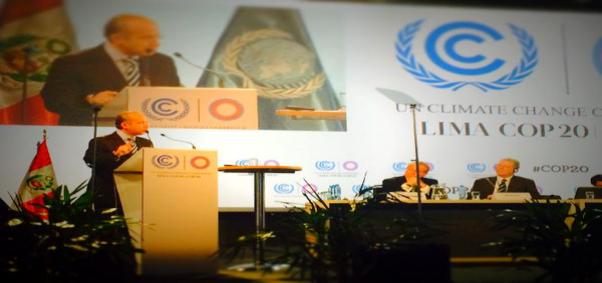Related Content
"We welcome this announcement and the fact that Mexico is the first major emerging economy to declare its commitment to a low-carbon future. This is an example for other countries, including developed countries, to follow,” former President Felipe Calderón and Chair of the Global Commission on the Economy and Climate said.
Chair of the Global Commission on the Economy and Climate Felipe Calderón joined Buenos Aires Mayor Mauricio Macri and Mexico City Mayor Miguel Ángel Mancera in announcing both the C40 City Bus Declaration of Intent and a Latin American Cities Declaration on the Compact of Mayors.
The study finds that Americans living in sprawled communities directly bear an astounding $625 billion in extra costs. In addition, all residents and businesses, regardless of where they are located, bear an extra $400 billion in external costs. Correcting this problem provides an opportunity to increase economic productivity, improve public health and protect the environment. The report identifies specific smarter growth policies that can lead to healthier, safer and wealthier communities in both developed and developing countries.
Ngozi Okonjo-Iweala and Jean-Pascal Tricoire have joined the Global Commission on the Economy and Climate.
Reducing consumer food waste could save between US$120 and 300 billion per year by 2030 according to a new report by WRAP (The Waste & Resources Action Programme) and the Global Commission on the Economy and Climate. To achieve this would require a 20-50% reduction in consumer food waste.
Chairs of the Global Commission on the Economy and Climate Felipe Calderón and Nicholas Stern issued statements welcoming the 14/2 announcement on climate change from the UK's three major political parties.
Ethiopia can harness urbanisation to secure high and sustainable economic growth and to achieve middle-income country status by 2025, says a new study by the Global Commission on the Economy and Climate, the Ethiopian Development Research Institute, and the Global Green Growth Institute.
World leaders need to make it clear that they choose an inclusive and sustainable economy over the ageing, carbon-intensive dirty economic model based on burning fossil fuels, writes Paul Polman in The Guardian.
India has an opportunity to improve the quality and quantity of economic growth, according the Global Commission on the Economy and Climate. Research conducted for the Commission, led by former President of Mexico Felipe Calderón, highlights the enormous opportunities for India in developing renewable energy and improving urban development. However future growth, in both Indian cities, but also the agricultural sector, is at risk from climate change.
In a statement from COP20, Lord Nicholas Stern welcomed the Lima climate change agreement. But he cautioned that the current scale of action to control and reduce greenhouse gas emission will not avoid the most global warming, and encouraged countries to continue to explore opportunities to increase emissions cuts.
In a statement discussing the progress made at COP20 in Lima, Felipe Calderon expressed his belief that progress had been made toward an international agreement that will send a clear signal to businesses and investors. According to Calderon, "Countries all around the world are beginning to see that it is in their economic interest to take action now."
Nicholas Stern welcomed the Lima climate change agreement as an important step on the path to Paris, but urged even more robust action. He encouraged new investments in clean development, which "hold the key to both managing the risks of climate change and overcoming poverty.”
In a speech at the 2014 UN Climate Change Conference in Lima, Peru, Felipe Calderon explained the main findings of the Global Commission on the Economy and Climate. The report's practical recommendations will boost growth, generate savings and reduce climate risk.
Before the 2014 UN Climate Change Conference in Lima, Peru, Felipe Calderon issued a statement saying that "Leaders gathering in Lima have as an opportunity to build stronger economies and to send a clear signal to businesses and investors.”
Five new studies provide real-world examples of how to achieve better patterns of urbanisation and highlight how cities can grow their economies while reducing greenhouse gas emissions. According to Graham Floater, director of cities research for the Global Commission, "a new breed of cities is emerging with compact, connected development – innovative cities that are more productive, attractive and low carbon."
China can achieve economic development, energy security and reduce pollution at the same time, according to a major study conducted by Tsinghua University in collaboration with the Global Commission. The report explains how China can face its development and climate challenges while maintaining growth of up to 7-8% in the near-term and 5% by 2030.
Helen Mountford, Programme Director of the New Climate Economy project welcomed the announcements by China and the United States on their plans to tackle carbon pollution. The targets set by the United States and China, the world’s two largest emitters of greenhouse gases, send a signal to the world about the scale and size of opportunities in global markets for low carbon goods and services.
Former President Felipe Calderon launched the New Climate Economy's "Better Growth, Better Climate Report" in Mexico, along with Helen Mountford, Director of the New Climate Economy and María Amparo Martínez Arroyo, General Director of the National Institute of Ecology and Climate Change.
A study by the World Resources Institute (WRI) identifies many real-world examples where government policies and sustained technological progress in the United States are creating opportunities to reduce greenhouse gas emissions, while delivering net economic benefits. "Business leaders are waking up to this reality and it’s time for more U.S. elected officials to do the same,” said Andrew Steer, President and CEO, WRI.
The findings of "Better Growth, Better Climate: The New Climate Economy Report" have received extensive coverage in print, online and in broadcast media. Highlights include The Economist, BBC, Bloomberg, and the New York Times.




















